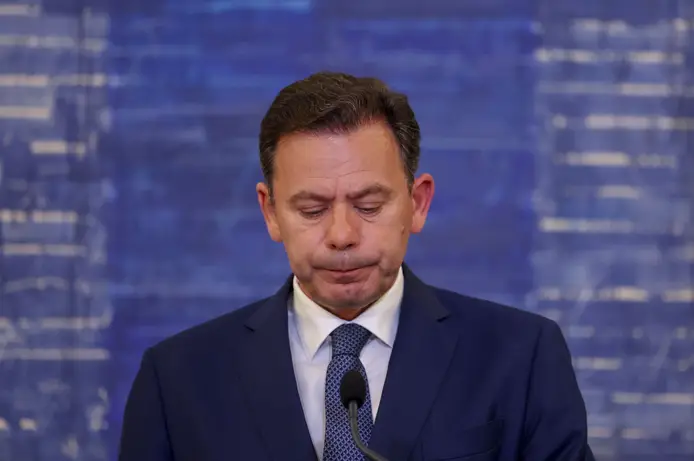Lights start turning on, slowly, from 5pm
Power is now almost fully restored throughout the country after the mass blackout – described by prime minister Luís Montenegro as “serious, unprecedented and unexpected” – of 11.33 yesterday morning.
The PM’s explanation to the country 10 hours later – after what amounted to an almost full working day of chaos – was “an abrupt increase in voltage on the Spanish grid, the origin of which we can’t explain at the moment”.
Indeed, the origin still has to be ascertained “serenely” with Spanish authorities, he said.
This explanation cut little ice with political opponents – and has certainly not impressed a former minister of industry from Mr Montenegro’s own party, Luís Mira de Amaral.
Mira Amaral told SIC Notícias early yesterday evening that what happened at 11.33am was the responsibility of both “PSD and PS ministers who made irresponsible decisions, without competence or knowledge”.
Holding a degree in electrical engineering, the 79-year-old economist said that the problem that led to this extraordinary, complicated and no doubt hugely expensive day centres on Portugal having only two generators capable of reacting in situations like this. It is a problem that was made more complicated when Portugal entered ‘the Iberian market’ for economic reasons – and closed its coal power stations. “When there’s a problem in the Spanish grid, Portugal is exposed”, he explained, adding that he still hasn’t understood what really happened, but that the story given so far sounds like “uma conversa para embalar” (translating into “a conversation full of falsehoods, manipulation and hidden intentions”.
With PCP communists demanding an urgent debate in parliament, and CHEGA leader André Ventura criticising the time it took to send information out to the population, the bottom line is that everyone wants to understand why Portugal’s infrastructures ‘failed’ because of something that took place within the electrical grid of another country.
Not in possession of a degree in electrical engineering, André Ventura is nonetheless of the opinion that what happened yesterday hinges on decisions that have left Portugal with a “brutal dependence” on its Spanish neighbour. “We closed our power stations, and became dependent on Spanish energy and supplies”, he told reporters.
None of this ‘gels’ with the frequent announcements on how much green energy the country has generated, but then announcements along these lines may also be ‘glossing round the issues’ of dependence.
Mira Amaral adds that political decisions that brought the country to this ‘sorry pass’ have failed to take heed of expert opinion: “Before becoming a minister, I was a network engineer at EDP. I know the system perfectly, I know what I’m talking about (…) many ministers have made irresponsible decisions, without competence and without having the common sense to listen to those who know”.
As for the time it took to ‘reboot’ the country’s electrical supply – a process known as ‘black start’ – the former PSD minister was equally scathing, suggesting it shows “serious technical failure” and requires “an inquiry to properly face the situation”.
Thus, with today certain to focus on the requirement for much more by way of convincing explanations, households everywhere are quietly ‘returning to normal’: phones are charging; fridges are humming again; schools plan on being open ‘as normal’; in Porto and Lisbon, the Metros should be back in operation early morning – water supplies are still patchy, but with luck the next few hours will see pipes pumping again.
The ‘miracle’ is that there weren’t (or don’t seem to have been) tragedies: towns and cities experienced the worst in the form of ‘chaos’: long queues outside fuel stations (almost all of which closed down); panic buying in shops (before many of these also closed their doors); widespread complaints about lack of water – but very little in the way of road accidents, even though traffic lights in the main were out.
State broadcaster RTP concentrated its radio station network on Antena 1 which ran through the day giving citizens up to date information. This was the day that having an ‘old fashioned radio with batteries’ was akin to being the one-eyed man in the land of the blind. According to Antena 1, battery powered radios ‘sold out’ in shops, as did batteries… but it was also this station that interviewed officials who extolled on the ‘kind and careful driving’ that was evident throughout the day, with drivers taking great care at junctions, and everyone focused on reaching their destinations in one piece.
People stuck in lifts were, in the main, rescued early on in the drama – and hospitals followed well-rehearsed procedures, backed by generators and plenty of diesel. All non-urgent business was ‘cancelled’ (this includes consultations) but inpatients and patients in intensive care etc. were all reported to be essentially unaffected.
For obvious reasons, the ‘great debate’ scheduled for this evening between the two main party leaders – ahead of elections on May 18 – did not happen. The prime minister convened his Council of Ministers shortly after the blackout began, and it continued throughout the day, apparently coordinating with the various authorities, albeit not giving out any useful information before the text messages, signed off by ANEPC (the national emergency and civil protection authority) shortly after 8pm last night. These messages were, in reality, very little help to people seeking reassurance. They said: “Connection to power is being done gradually. With everyone’s serenity, we will guarantee all essential services and the normalisation of the situation in the next few hours”. The wording almost suggested that if people were not serene, power would take longer to restore. As it was, power limped back from north to south, starting late afternoon in Gaia/ Coimbra areas, and slowly creeping down the country until it arrived in the Algarve, first in the areas around Faro and later further to the west, where water supplies are still unavailable as we write.
As for the caretaker government’s handling of this crisis, the morning will bring more in the way of opinions (and very possibly criticism). Luís Montenegro, in his address to the nation at 9.30pm last night, declared that the state had shown “response capacity” – this in the fact that it “decreed energetic crisis” and managed fuel supplies to hospitals, which would have collapsed, he said, without the diesel supplied by tankers.
Airports were other ‘centres of despair’ as hundreds of flights were cancelled; hundreds of arrivals were left without luggage (which they have been told they can collect today) and others faced a long walk into the city as taxis were nowhere to be found.
Buses also were in short supply, and those running were full to bursting.
Porto’s fleet of electrical buses were not running, reported Antena 1, stressing “only diesel buses” could be seen in the streets.
But at least the worst of yesterday appears to be over. Stories will come on how much all the upset has cost – but it is worth remembering that the European Commission warned people only a month ago to “be prepared” for situations in which they could be ‘high and dry’ for up to 72.hours… the advice was “stock up on water, canned goods and get a shortwave radio” (all the things that many people were scrambling to find yesterday…) ND


























